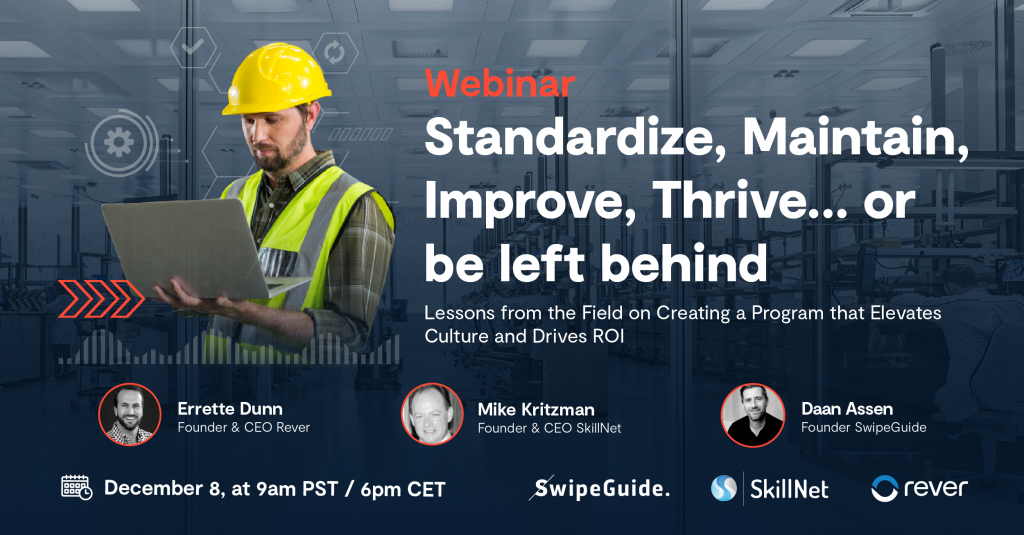Series (1/6): Adjusting Operations to the Ongoing Pandemic
4 minutes, 25 seconds read

Learn more about, and connect with, our presenters on LinkedIn:
Errette Dunn, Founder & CEO Rever (learn more about Rever)
Daan Assen, C0-founder SwipeGuide (learn more about SwipeGuide)
Mike Kritzman, Founder & CEO SkillNet (learn more about SkillNet)
Host: Ralf VonSosen, Chief Solution Office, Rever
In this segment, we dive into how the ongoing pandemic has impacted the operations of companies around the world with a focus on the impact on the frontline workforce.
Watch here! See the live discussion.
Ralf VonSosen:
Errette, maybe you can get us started on how you have seen companies adjusting their operations in response to the pandemic.
Errette Dunn:
I will not dwell too much on the immediate response of companies during the height of the first wave or two of the pandemic, the new rules, social distancing, and cleaning measures. I think everybody is already very familiar and affected by that. But I’d be very interested in actually seeing the aftermath right now that companies have settled into a new normal of this new way to work from now on. Some of the consequences of the pandemic, and I think there’s an overarching theme here, the pandemic has accelerated a demographic phenomenon that was already several years in coming. Lots of the people who had most experience in these companies, you know, the older workforce that has been in the company several years and who perhaps were hesitating to retire are definitely now retiring or not coming back to the active workforce.
So a lot of companies are struggling, especially in developing countries, to replace those workers. It’s not just the number of heads, it’s their most talented workforce that they have lost. They are having trouble attracting the new, younger generation of talent. Perhaps because the younger generation has a different expectation of what they want at work in terms of environment, technologies, learning experiences and so on. This younger generation perhaps also has a misconception of what manufacturing, modern manufacturing, looks like. So it’s a triple challenge that companies are now solving and facing. One is the scarcity of talent and their best talent leaving. Therefore, how do they retain that knowledge of the people who are leaving, how do they retain that knowledge? That could be in the form of standards, training material and re-skilling individuals, upscaling programs within companies.
Another consequence of having less people in your operations, besides adapting to new ways of working and your new standards, training programs is that with less people, you have less room for error. The normal issues that happen on the factory, shop floor every single day, these problems are much more obvious because you have less buffer of people to absorb those issues. So companies have to learn, and are learning how to react better and more proactively, and in a more data driven manner to those problems. So it’s a triple combination of problems of skills, talents, and standards, as to how you react to problems. I see companies now embracing more technologies to help address those aspects. So I think that’s an overarching summary of the theme, the main theme I see post pandemic.
Ralf VonSosen:
Great points. Daan, Mike, anything that you’d like to add to that?
Daan Assen:
I fully support what Errette was talking about. I think for me the magic word for companies is resilience. In your operations and how to get there through capturing the knowledge, making sure that you have solid training programs in place to make sure that you can build in that resilience under the pressure of people leaving the company, people falling out due to sickness in the beginning of COVID, for instance, but also prepping, for the future. I think technology is a great enabler for all of that.
Mike Kritzman:
I know we all wish the pandemic would just be over it. It has dragged on for what seems like way too long, but I think companies have no choice, but to build resilience. Resilience is a great word in engaging people in their jobs. Resilience seems more important now than ever because there’s so much chaos around us.
Ralf VonSosen:
That’s a great way to start us off in terms of how people are adjusting their operations, and specifically setting the stage about the importance of people, the importance of standards, and of being exact in how you’re operating with less room for error.
Read more from this wonderful discussion:
- Adjusting Operations to the Ongoing Pandemic (1 of 6)
- Power of Standardization and Standard Work (2 of 6)
- Driving Continuous Improvement (3 of 6)
- Building and Managing Skills (4 of 6)
- Leveraging the Power of Technology (5 of 6)
- Advice for 2022 – It’s about your people (6 of 6)
OR, watch the Video Recordings (each is 5-10min in length):
- Adjusting Operations to the Ongoing Pandemic (1 of 6)
- Power of Standardization and Standard Work (2 of 6)
- Driving Continuous Improvement (3 of 6)
- Building and Managing Skills (4 of 6)
- Leveraging the Power of Technology (5 of 6)
- Advice for 2022 – It’s about your people (6 of 6)
Like this content? Sign up for our Newsletter
[hubspot type=form portal=561211 id=fda6d445-739e-4072-8dae-68b94971a266]THE FRONTLINE DOJO
More Articles
How to develop the next billion Knowledge Workers
3 minutes, 51 seconds read
Digital transformation in manufacturing is not what you think it is
10 minutes, 36 seconds read
The human side of change management: lessons learned from Toyota, Airbus, and Silicon Valley
1 minute, 28 seconds read
The true meaning of Genchi Genbutsu
3 minutes, 5 seconds read
